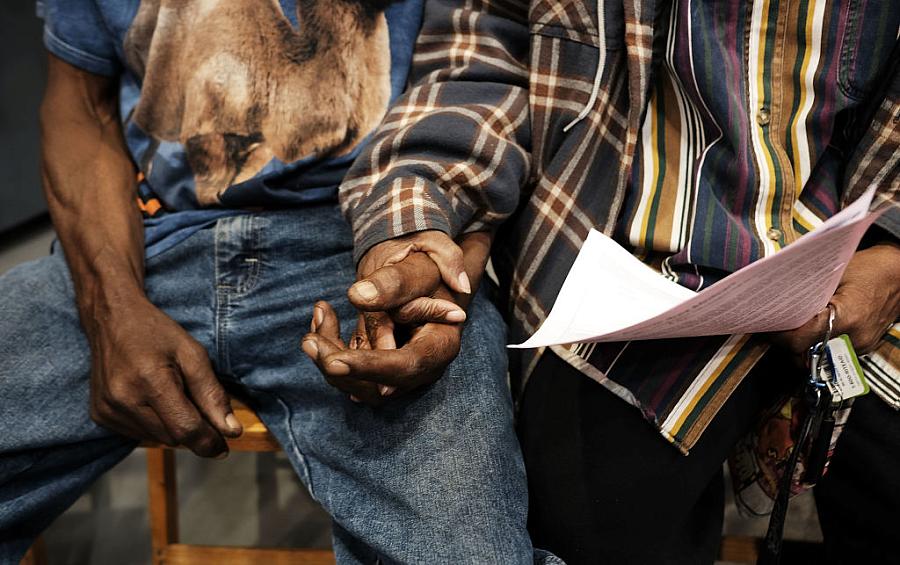Health Care on the Line: When will Washington listen to health care's forgotten voices?

A couple hold hands at dawn, after sleeping in their cars, to see a doctor at a free mobile dental and medical clinic in Olean, New York.
(Photo by Spencer Platt/Getty Images)
Editors’ Note: As the case against Affordable Care Act goes before the U.S. Supreme Court this week, the Center for Health Journalism is sharing a series of stories about the impacts of this transformative law.
This week, as the U.S. Supreme Court heard yet another challenge to the Affordable Care Act, I am thinking about Pastor Daryl Arnold.
I met him three years ago, while I toured the country reporting on the health law. The Trump administration had shortened the timeline to sign up and significantly cut funding to help people select health plans. People barely able to afford premiums were afraid of losing coverage. They felt Washington wasn’t listening to them. We called them Forgotten Voices.
Pastor Arnold led a congregation in a neighborhood where the average income was less than $1,000 a month. Before the ACA, many of his parishioners were uninsured – like the pastor and his family. When his daughter was bitten by a dog, he couldn’t afford to take her to the hospital. “I just had to pray,” he told me.
I’m thinking about Susan Moore, the elderly woman who brought me to tears in a Kentucky clinic. She couldn’t afford a $5 ride to dialysis three times a week. Medicare and Medicaid paid for the treatment but stopped covering her transportation. “I don’t have the money,” Susan told me. Stressed over how to get to dialysis, she just gave up and said, “I’d rather die.”
Choosing death, over a health care bill smaller than what some of us spend at Starbucks every week.
I’m thinking about April White. Her son was born with a cleft palette. He had four surgeries before kindergarten and needs one more. They qualify for Medicaid under the ACA expansion. But if the law is dismantled, where would they find thousands of dollars for another surgery?
Making dinner in her Tennessee kitchen, April told me she worried how she and her husband would put food on the table if they had to buy private insurance. She had a job with health insurance but was laid off when the business went under. So the kids are back on Medicaid. It pays her son’s medical bills and covers speech therapy. She’s grateful. “Because of his Medicaid I don’t sit up at night worrying if we can give him the care he needs.”
April’s family is stuck in the middle – barely qualifying for government assistance, but without the ACA, unable to afford private insurance.
April, Susan, Pastor Daryl – they’re all at risk if the Affordable Care Act goes away.
I talked to April this week. It was like we were back in her kitchen three years ago. She’s been reading about the Supreme Court case and describes the same feeling she had when her family’s health care was in limbo.
RELATED: Health Care on the Line: How the Affordable Care Act kept me out of prison
Health Care on the Line: The ACA is my lifeline
Health Care on the Line: The ACA helped LGBT Americans heal in more ways than one
Health Care on the Line: What Americans will do for health insurance
“I just feel totally powerless about it because we’re still very dependent on ACA,” April says. “I just feel sick about it.”
I thought about when my son broke his leg and needed surgery because the bone wouldn’t heal. He was in a cast for two months. We saw specialists. He had an MRI to rule out bone cancer. He used a bone stimulator. He had two surgeries: one to install a metal plate and screws, another eight months later to remove them when that didn’t work.
I worried about his leg, but I never worried about the cost. My employer-sponsored insurance paid the bills. Unlike April, I never had to decide between getting him to a doctor and putting food on the table.
Two mothers. Two sons. Two very different stories about health care in America.
Now we’re facing these challenges in the middle of a pandemic. Ten million people have already been infected with the coronavirus and suddenly have a pre-existing condition. My neighbor, my co-worker, a mom who sang in the church choir with me when we were kids — they’re all recovering from COVID-19. The ACA guarantees they can’t be denied insurance. But if the Supreme Court strikes down the law, that guarantee goes away, along with other protections and benefits.
Under the ACA, my college student can stay on our plan until age 26. Without the health law, what will happen when she graduates and no longer has coverage? I hope she can find a job with benefits in the post-COVID economy. But 12 million people remain unemployed and 22 million more are underemployed, often with no health insurance.
As I think of these families, and my own, I remember the question we asked three years ago:
Washington – are you listening?

